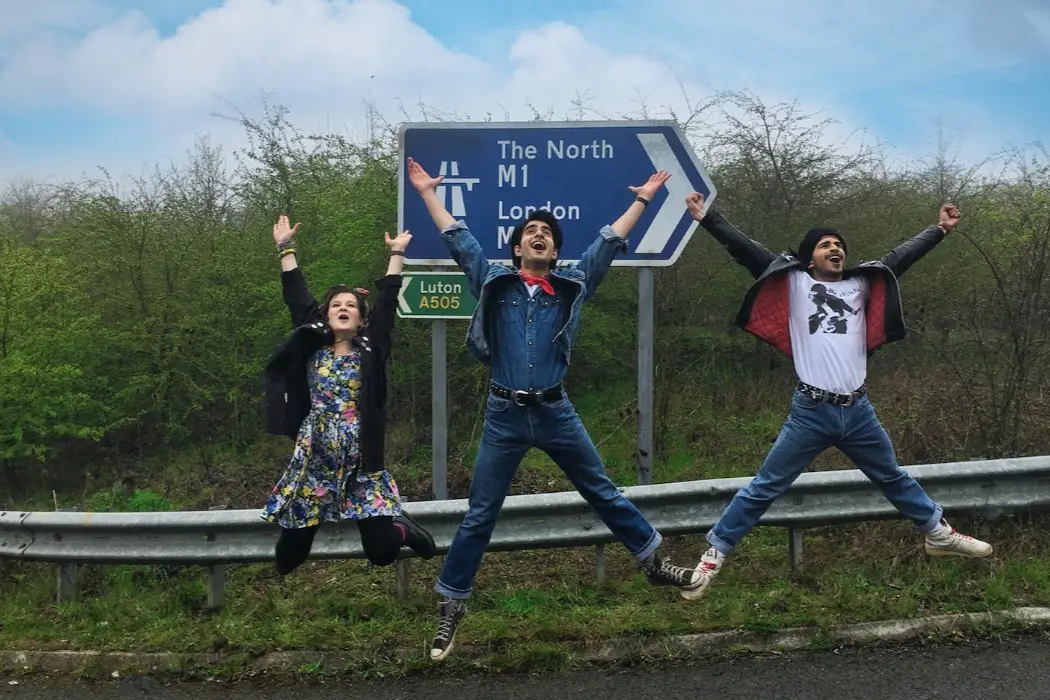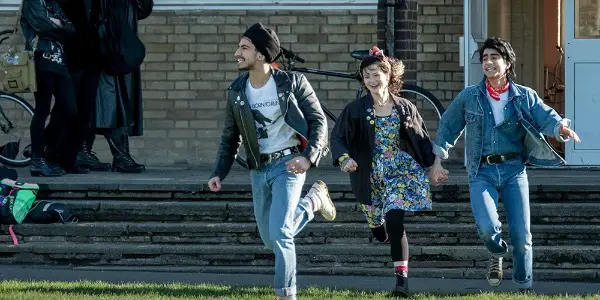BLINDED BY THE LIGHT: A Love Letter To Bruce Springsteen & The Power Of Music

Alistair is a 25 year old writer based in Cambridge.…
If the idea of the American teen movie conjures images straight out of a John Hughes movie, the trials and tribulations of adolescence transformed into joyous fantasy, then the British teen movie has been known to offer something far more oppressive in comparison. From the heightened social embarrassment inherent to the character arcs to the stifling small towns in which these stories are set, they are as far removed from Hollywood escapism as conceivable – which is what makes Gurinder Chadha‘s blend of teen movie sensibilities from both sides of the Atlantic so intriguing.
Darkness on the Edge of (Luton) Town
Blinded by the Light is, in many ways, a return to her comfort zone as a director. Chadha‘s two most commercially successful films (2002’s Bend it Like Beckham and 2007’s Angus, Thongs and Perfect Snogging) anglicised archetypal coming-of-age traits, offering substantial homegrown alternatives to imported teen movies. Her brand of escapism is all the more transportative due to the reality it’s grounded within; this latest film, based on the teen years of journalist and co-screenwriter Sarfraz Manzoor, does indulge in the distinctively adolescent fantasy of imagining movie scenes scored to your favourite songs. But it does so in a town crippled by rising unemployment and a resurgent violent street racism, with the musical escapism providing little catharsis when it has to be hidden from conservative parents at home, alongside any dreams of moving away in search of a better future.
Chadha‘s film is undeniably corny, falling prey to numerous clichés of the genre and the much utilised period setting. And yet it still feels like a very personal testament to the power of music to reach out and make us forget about the humdrum miserabilism of our every day lives – even if it’s just for a few minutes. It’s a broad crowd pleaser painted on the most intimate canvas.

Set in the English town of Luton in 1987, Blinded by the Light follows Javed (Viveik Kalra), a 16-year-old Pakistani teen who writes poetry and lyrics for his best friend’s band as an escape. He dreams of being a writer, but hides this from his conservative father, who is trying to force him to forge a career in business or economics in order to help the family’s struggling finances. After starting a creative writing college course that he assures his dad is really a business degree, he struggles to make friends at the cliquey school, and befriends a similarly lonely Sikh student, who is a big fan of Bruce Springsteen.
Javed had never heard the Boss before, listening to only the same synth pop his best friend loves, and hitting play on his music for the first time, something clicks into place. His dream of becoming a writer is reignited, and suddenly he sees a path out of the town his family want him to waste away his life staying in – the power of music in its purest form.
Subverts the fantasy of 80’s teen movies
To Chadha‘s credit, she repeatedly uses the most overblown period details as jokes, without ever threatening to break the fourth wall. The film is introduced with a near parodic voiceover informing us of the current number one hit in the charts and the political state of the world, while later, the image of Margaret Thatcher often quite literally looms over the characters in their lowest moments. There are even period cliches that many are afraid to use in a post-Wet Hot American Summer world, such as the school radio DJ who somehow manages to provide the soundtrack for the entire town. But these details are all important within the early stages – the fantasy of teenage life presented by the American media of the 80’s struggling to reconcile itself with the grim realities for a working class Pakistani family in Thatcher‘s Britain. Young people are trying to use the synth pop of the era as escapism, but the fantasy feels too jarring when walking through a town where the lack of job opportunities can be felt on every street corner.
If Blinded by the Light is a very specific story about one man discovering the music that defined his formative years, it does a good job articulating this in grandiose terms. Bruce Springsteen‘s lyrics may reflect the bleak realities of working class life in America, but Chadha does a fantastic job visualising how his songs could resonate on the other side of the Atlantic – his lyrics boiled down to the universal dream of escaping to find a better life, without ever simplifying the deeper meaning behind them. She visualises certain lyrics onscreen in a way designed to make you lean in and listen closely to the words being omitted; this is an initially jarring technique (especially when used in a song as familiar as “Dancing in the Dark”), but eventually seems to capture that feeling of listening to music that would end up changing your life. Some lyrics jump out at you the first time, with even deeper meanings to be discovered when you hit the repeat button – but everything seems to have fallen into place even without a clear view of the complete picture.

It’s very easy to imagine that the detractors of Blinded by the Light will claim it’s a film celebrating a character who believes liking Bruce Springsteen is enough to constitute a personality. I’d argue that this is a gross oversimplification of a film that touches upon the relationship between Western pop culture and Pakistani heritage, as well as the mass working class poverty and violent racist marches that punctuated the Thatcher years. But I’ll humour that criticism and say that this is a very accurate representation of how teenagers process their favourite music through their formative years – when the only currency you have is the pop culture that is shaping the way you see the world, and imagining the life ahead of you.
Although inspired by Bruce Spingsteen‘s music, and co-written by a man who (we are later told) would go on to see the Boss live more than 150 times, the movie is often at its best when imagining a fantasy a world away from what his lyrics portray. Many of his anthems are reimagined as musical numbers, providing heightened joy that all but obscures the miserable day to day life happening around the characters – again, an aspect some may find corny but feels of a piece with the working class grit, despite appearing as its polar opposite. After all, when the opening act introduces us to a town with meagre job prospects, a stifling parental relationship with no interest in the child’s own future goals, and a racism so normalised Asian families have had to buy special mats to catch all the piss coming through their letter boxes, why wouldn’t anybody try to create an escape using the few tools at their disposal?
Blinded by the Light: Conclusion
Blinded by the Light is a fabulous ode to the power of music, and how our favourite artists can define our lives due to the passion we feel for them. Even if you’re not a Springsteen fan, you’ll still find yourself rushing to stream his back catalogue as soon as the end credits roll.
Blinded by the Light is released in the UK on August 9, 2019 and in the US on August 16, 2019. All international release dates are here.
Does content like this matter to you?
Become a Member and support film journalism. Unlock access to all of Film Inquiry`s great articles. Join a community of like-minded readers who are passionate about cinema - get access to our private members Network, give back to independent filmmakers, and more.
Alistair is a 25 year old writer based in Cambridge. He has been writing about film since the start of 2014, and in addition to Film Inquiry, regularly contributes to Gay Essential and The Digital Fix, with additional bylines in Film Stories, the BFI and Vague Visages. Because of his work for Film Inquiry, he is a recognised member of GALECA, the Gay & Lesbian Entertainment Critics' Association.













